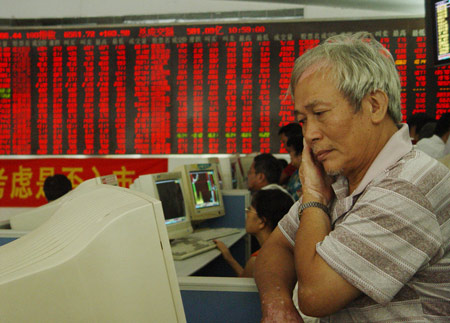Top Biz News
Investors still keep the faith
(China Daily/Agencies)
Updated: 2009-09-14 07:37
|
China's stock market remains attractive to investors, given high expectations about the economic recovery. [China Daily] |
Companies and investment banks are keeping their deep faith in China, viewing a recent plunge in the country's stock market as a sideshow and its economic recovery as the real and more important story.
The benchmark Shanghai Composite Index is down 20 percent from its 2009 peak last month, even after a slight rebound last week, sowing doubt in some minds about the world's third-largest economy.
But the Chinese stock market is notoriously volatile.
Just as its highs seem to defy reasonable valuations, so has its sell-off in recent weeks borne little resemblance to the robust recovery in the country's factories, shopping malls and construction sites, analysts said.
"People must be pessimistic for the market to have fallen so much in one month," said Chen Dongqi, vice president of the Macro-Economic Research Institute under the National Development and Reform Commission (NDRC).
"But this should not change the trend of the economic recovery," he said.
Chen said the government is committed to the "appropriately loose" monetary stance it adopted at the outbreak of the global financial crisis and will not make knee-jerk policy decisions in response to market movements.
The trigger for the sell-off of Chinese shares was concern that the government had already begun an undeclared monetary tightening by leaning on banks to abruptly slow new lending.
Chinese banks loaned 356 billion yuan in July and are expected to have made even fewer loans in August, down from a monthly average of 1.23 trillion yuan in the first half.
Choosy banks
Yang Zaiping, executive vice president of the China Banking Association, said the market had failed to appreciate the lending slowdown for what it really was: an attempt to ensure that bank credit goes where it is most needed.
"We have to be more choosy in our lending," Yang said.
|
||||
Banks unleashed the record flood of loans at the start of the year to match the government's front-loaded 4 trillion yuan stimulus plan, the crux of Beijing's efforts to deliver 8 percent economic growth this year. It's a target that most analysts think is now well within its grasp.
Chinese banks typically issue the bulk of their loans during the first half of the year, leaving companies to draw on credit over the subsequent months - a pattern that looks set to be replicated this year.
"It will not affect economic growth," Yang said. "There are a lot of irrational things in the stock market, like a herd effect."
Deal flow
Despite the recent volatility, valuations are sufficiently stable and liquidity is ample enough to ensure a steady stream of Chinese share issues for the time being, said Philip Partnow, deputy head of UBS's investment banking department in China.
"It will be a very active third quarter, and we hope that will continue into the fourth quarter," Partnow said.
Before the recent sell-off, China's domestic A-share market was up 109 percent from its trough in November, a rally that had outpaced the economy's rebound from a virtual stall late last year to 7.9 percent annual growth in the second quarter.
"It is very healthy to have a pull-back after a very significant run-up in a very short period of time," said Brian Gu, head of mergers and acquisitions (M&A) at JP Morgan Greater China.
"The A-share market is obviously important for people to get a sense of the whole regulatory environment in China and also the sentiment around Chinese shareholders," Gu said.
"But as it relates to M&A volume, I don't see a clear correlation," he said.














